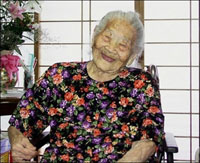 |
|
Kamato Hongo, seen here in September 2001, was recognized as the world's oldest person when she died in 2003 at age 115.
|
More than 28,000 Japanese are 100 years or older, up from a mere 1,000 at the start of the 1980s as solid health habits increase the graying of the population.
The number of Japanesecentenariansincreased by 2,841 from last year, bringing the total to 28,395, the Ministry of Health, Labor and Welfare said Friday.
The oldest person is a woman, Yoneko Minagawa, 113, from the main southern island of Kyushu, said the survey.
Women accounted for an overwhelming 85 percent of the centenarian population at 24,245, nearly six times more than the number of men, the ministry said in a report.
The Japaneseknackfor longevity is often attributed to the traditional healthy food and lifestyle, despite the rigors of life in the crowded big cities.
But the government is also struggling to find ways to put a brake on Japan's declining birthrate, which is essential to support elderly care.
Japan had a mere 153 centenarians in 1963 when the government started counting. The number topped 1,000 in 1981 and surpassed 10,000 in 1998.
Japan's southern regions of Okinawa, Shikoku, and Kyushu are home to the highest concentrations of centenarians.
Prime Minister Junichiro Koizumi's cabinet will send commemorative silver cups congratulating Japanese people who celebrated their 100th birthdays this year.
Japanese woman Kamato Hongo was recognized as the world's oldest person when she died in 2003 at age 115.
|
良好的健康习惯是日本长寿老人增多的一大原因,目前,日本百岁及百岁以上的老人达到28000人之多,远远超过上世纪80年代初的1000人。
上周五,据日本厚生劳动省(健康、劳工及福利部)介绍,今年日本百岁老人的数量比去年多2841人,百岁老人的总数也增加到28395人。
调查显示,目前日本年龄最大的老人是来自日本南部九州岛的一位名叫米子皆川的老太太,今年113岁。
据厚生劳动省的一份报告显示,百岁老人中的女性老人占大多数,为85%,其总人数达到24245人,是百岁男性老人的近6倍之多。
尽管拥挤的城市生活让人劳累,但传统的健康饮食习惯和生活方式一直是日本人长寿的秘诀。
同时,日本政府也在想方设法解决日本出生率不断下降的问题,这对老年人护理业至关重要。
1963年,日本开始对百岁老人数量进行统计,当时全国只有153名百岁老人,而这个数字在1981年就达到了1000,1998年突破1万。
百岁老人主要集中在日本南部的冲绳岛、四国岛和九州岛等地区。
日本首相小泉纯一郎内阁将为今年过一百岁生日的老人送上纪念银杯,以表庆贺。
于2003年去世的日本女寿星门真本江被认为是目前世界上寿命最长的人,享年115岁。
(英语点津姗姗编辑)
|